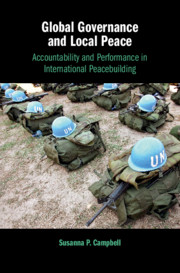Book contents
- Global Governance and Local Peace
- Global Governance and Local Peace
- Copyright page
- Contents
- Figures
- Tables
- Acknowledgments
- Abbreviations and Acronyms
- Introduction
- 1 Local Peacebuilding and Global Accountability
- 2 The Country Context: Burundi from 1999 to 2014
- 3 INGOs in Peacebuilding: Globally Unaccountable, Locally Adaptive
- 4 International Organizations in Peacebuilding: Globally Accountable, Locally Constrained
- 5 Bilateral Development Donors: Accountable for Global Targets, Not Local Change
- Conclusion
- Bibliography
- Index
5 - Bilateral Development Donors: Accountable for Global Targets, Not Local Change
Published online by Cambridge University Press: 21 May 2018
- Global Governance and Local Peace
- Global Governance and Local Peace
- Copyright page
- Contents
- Figures
- Tables
- Acknowledgments
- Abbreviations and Acronyms
- Introduction
- 1 Local Peacebuilding and Global Accountability
- 2 The Country Context: Burundi from 1999 to 2014
- 3 INGOs in Peacebuilding: Globally Unaccountable, Locally Adaptive
- 4 International Organizations in Peacebuilding: Globally Accountable, Locally Constrained
- 5 Bilateral Development Donors: Accountable for Global Targets, Not Local Change
- Conclusion
- Bibliography
- Index
Summary
- Type
- Chapter
- Information
- Global Governance and Local PeaceAccountability and Performance in International Peacebuilding, pp. 201 - 228Publisher: Cambridge University PressPrint publication year: 2018



